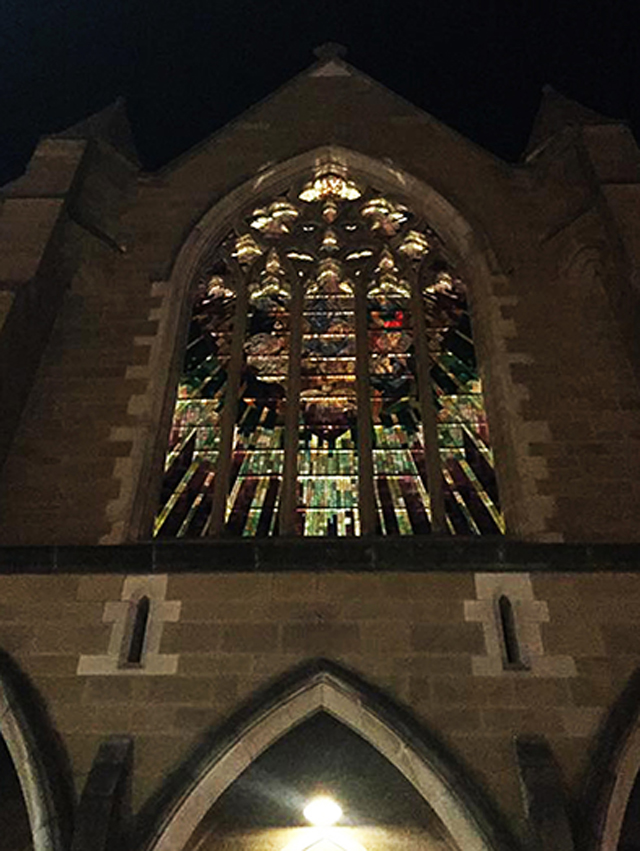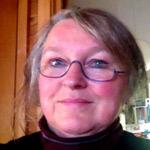
It’s not biblical, but no one knows exactly where this proverb came from. It’s been attributed to Confucius, Eleanor Roosevelt, John F. Kennedy and others. It appears in various forms in several cultures. And this proverb has been rather pertinent in my town this past couple of weeks.
It’s the middle of the year, the Winter Solstice, when we have the longest night-shortest day. The sun rises around 07.30 and sets around 16.30, and as always the lingering colours of dawn and sunset in our higher latitudes are glorious. It is very cold and dark, but most days dawn to sunshine and crystal bright skies.
This is also the time of the Dark MoFo Festival which celebrates the cold and the dark. The town is lit with red and there are lights atop building cranes, and tall buildings, and the bridge. Many of these lights are in the shape of a cross.
Questions
The festival is in many ways a pagan, primal celebration of the circle of life and death but beneath the pleasures and indulgence are questions. Art installations and concerts, edgy performances of drama and music, and discussions all challenge people to think about the meaning of life, to look beyond the obvious, not just take things at face value.
Groups of people including families – much of the activity is family-friendly – gather around the warmth of spit roasts and fire-pits, huddled in down jackets and woolly hats. Conversations flow as freely as the mulled wine and hot chocolate. A couple of thousand people strip bare and plunge into the chilly waters at the crack of dawn on the day of the Solstice. (It’s worth noting here that many of these are interstate and overseas visitors – not just crazy Tasmanian locals!)
Overall the vibe is good, momentarily banishing the cold and dark just as our ancestors did in colder climes for thousands of years. The Solstice marks the turn of the season, the beginning of the end of the long, dark cold of winter.
What I have described sounds like an utterly pagan, decadent and indulgent feast for the senses. In many ways it is and it certainly draws outrage and hostility from some Christians. They see it as the work of the devil, to be opposed and ideally banished from our civilised society.
Many good folk fret and fume and rail against the wickedness of this world, the evil influence in our town. Letters are written, social media posts condemn. Public meetings gather to seek to remove the red crosses, ban the pagan rituals, the roasting of beasts, the nude swim.
But … But … is fretting and fuming a solution?
I know of one church that took a completely different view, and what a different view that was!
Instead of a Dark Feast we had ‘A Light Repast’, a celebration of light and life. The play on words was quite intentional, a ‘light repast’ being a simple yet nourishing meal, not so different from the meals Jesus shared with his disciples: bread and fish, Passover, and the ultimate simple meal of bread and wine at the last supper.
Our church was invited to join others in the city by letting light shine outwards. Spotlights were installed INSIDE the windows so that the glorious stained glass beamed out onto the streets. God’s light shining forth.
Inside our church was a very fine exhibition. Paintings and sculptures depicted the artists’ faith experiences and all were glorifying God. A meditation booth invited quiet contemplation and prayer. Music spoke of God’s love and beautiful light. 100 half-hour Bible readings took place over the two weeks of the celebration. A couple of coffins stood at the front, bedecked with flowers and bible verses affirming resurrection and eternal life. A huge scarlet banner of ‘blood’ fell from the carved rood screen, from the feet of Christ on the cross down to the floor between the coffins.
Questions, challenges, celebration. And light. There was so much light in the darkness.
Death was acknowledged as part of the human journey; Christ as the way to eternal life.
The questions are ongoing. The conversations continue. The challenge is to keep the light burning.
We didn’t ‘curse the darkness’.
We lit a candle.
.jpg) Sheelagh Wegman, BA, IPEd Accredited Editor is a freelance writer and editor. She enjoys reading, music, sings in the choir of St David’s Cathedral in Hobart and lives in the foothills of kunanyi/Mt Wellington.
Sheelagh Wegman, BA, IPEd Accredited Editor is a freelance writer and editor. She enjoys reading, music, sings in the choir of St David’s Cathedral in Hobart and lives in the foothills of kunanyi/Mt Wellington.
Sheelagh Wegman’s previous articles may be viewed at http://www.pressserviceinternational.org/sheelagh-wegman.html

Sheelagh Wegman is a freelance writer and editor. She is in the community of St David’s Cathedral in Hobart and lives in the foothills of kunanyi/Mt Wellington.
Sheelagh Wegman’s previous articles may be viewed at http://www.pressserviceinternational.org/sheelagh-wegman.html